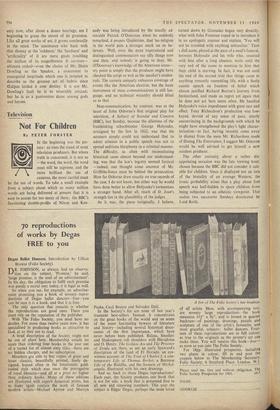Television
Not For Children
By PETER FORSTER
en- nedy was being introduced by the usually ad- mirable Patrick O'Donovan when he suddenly remarked, d propos Quakerism, that 'no religion in the world puts a stronger mark on its be- lievers. Well, even the most experienced and distinguished commentators say silly things now and then, and nobody is going to deny Mr. O'Donovan's knowledge of the American scene— my point is simply that the producer might have checked the script as well as the speaker's creden- tials. The camera uniquely enhances coverage of events like the American election, but the basic instrument of mass cummunic'ations is still lan- guage, and no technical wizardry should blind us to that.
Non-communication, by contrast, was at the heart of John Osborne's first original play for television, A Subject of Scandal and Concern (BBC), last Sunday, because the dilemma of the freethinking schoolmaster George Holyoake, arraigned by the law in 1842, was that his accusers simply could not understand that to admit atheism in a public speech was not to spread seditious blasphemy in a criminal manner. The difficulty, as often with reconstituting historical cases almost beyond our understand- ing, was that the law's bigotry seemed farcical —indeed, one thought some ancestor of Mr. Griffiths-Jones must be behind the prosecution. How far Osborne drew exactly on true records of the case, I do not know, but either way he would have done better to allow Holyoake's tormentors a stronger hand. After all, much of St. Joan's strength lies in the plausibility of the judges.
As it was, the piece (originally, I believe,
turned down by Granada) began very drearily, what with John Freeman roped in to introduce it in an apologetic manner and explain. 'You will not be troubled with anything unfamiliar.' Then a dull scene, played at the pace of a snail's funeral, between Holyoake and his wife who, reunited with him after a long absence, waits until the very end of the scene to mention to him that their child is starving. In fact, it was not until the end of the second trial that things came to anything remotely resembling life, with a finely caustic speech on freedom of belief which almost justified Richard Burton's journey from Switzerland, and made us regret yet again that he does not act here more often. He handled Holyoake's voice impediment with great tact and effect. Tony Richardson's production was low- keyed, devoid of any sense of pace, utterly unconvincing in the backgrounds with which he might have strengthened the play's light charac- terisation—in fact, having recently come away in dismay from the mess Mr. Richardson made of filming The Entertainer, I suggest Mr. Osborne would be well advised to get himself a new resident producer.
The other curiosity about a rather dis- appointing occasion was the late viewing hour, chosen because the BBC did not consider it suit- able for children. Since it displayed not an iota of the brutality of an average Western, the ironic probability arises that a play about free speech was half-hidden to spare children from being subjected to an atheistic viewpoint. That makes two successive Sundays dominated by Lord Reith.














































 Previous page
Previous page